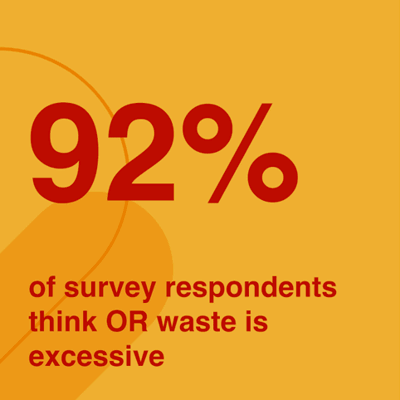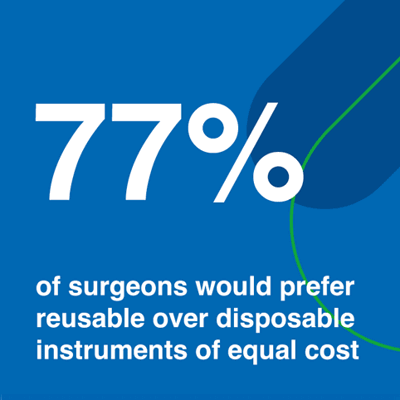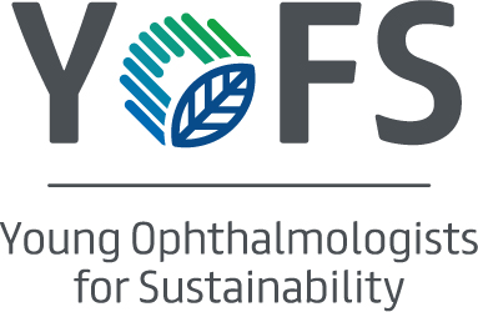Sustainability

The photo shows the OR-waste from one day of cataract surgery in Hanusch hospital, Vienna, Austria.
A Way to Awareness of Sustainability Themes and Environmentally Friendly Practices
Sustainability is a key aspect of, not only environmental protection, but also the longevity of the healthcare system.
Sustainability and ophthalmology
Climate change is already a major threat to global health in the 21st century and is expected to worsen in the future.1
As physicians, the core of our work (improving public health) is threatened by the climate crisis. Paradoxically, the healthcare sector significantly contributes to climate change through its high resource and energy consumption. Healthcare is among the largest greenhouse gas (GHG) polluters globally,2 accounting for 4.4% of the world’s total GHGs in 2019,3 and equivalent to the fifth largest carbon emitter if considered by country.4 71% of these emissions come from the manufacture, use, and disposal of healthcare supplies.5 Operating rooms (ORs) account for a major share: Operating room waste accounts for about 70% of the healthcare carbon footprint in Europe6 and 20-33% of hospital waste in the US.7 Furthermore, ORs consume 3 to 6 times more energy per square meter than any other department in the hospital.8
Due to this dual role of healthcare regarding climate change, doctors are ideally the ones to lead by example. Ophthalmologists are in a unique position because cataract surgery stands out as one of the most frequently performed surgical procedures globally, with a staggering number of over 65 million people affected by cataracts. Given this context, ophthalmologists have a compelling opportunity and obligation to lead efforts to make healthcare more sustainable, by reducing the environmental impact of eye healthcare.9,10
What do ophthalmologists think?
In a survey of the members of the ESCRS cataract surgeons, 99% were concerned about global warming and climate change; 92% felt that operating room waste is excessive and should be reduced; most respondents cited restrictions on reuse by manufacturers and regulatory bodies as major drivers of this waste. There was a strong desire to have more reusable options for instruments.
In comparable percentages with an earlier survey of North American cataract surgeons using the identical questionnaire, there was a strong willingness to reuse many surgical supplies, as well as topical and intraocular medications. This was true even though the ESCRS members were more likely to practice in hospitals (68% vs 35%). The similarities of these results to the North American survey suggest that these attitudes towards sustainability are in fact global and universal. The strong concordance between the 2 surveys suggests that global collaboration is both possible and necessary.
One of the challenges in incorporating more sustainable practices, despite the increased aware-ness, is not knowing where to start. The second is a risk of burnout as it takes effort and time to keep up with it, which might conflict with other important clinical issues such as infection control and prevention, regulatory and other legal requirements, protocols enforced by accrediting bod-ies, and cost containment (https://www.aaojournal.org/article/S0161-6420(23)00137-9/fulltext).


Next Steps by ESCRS
ESCRS Mission Zero
In 2021, ESCRS launched “Mission Zero”. Our vision is to develop events with zero waste to landfills and zero net carbon emissions that are a role model for social and environmental responsibility.

EyeSustain
The healthcare sector accounts for 5-10% of total carbon emissions in higher income countries. With the highest procedural volumes in medicine, ophthalmology has a unique opportunity to lower this environmental impact by reducing unnecessary waste in our services. Tackling a global problem such as sustainability in healthcare requires broad collaboration. For this reason, EyeSustain was formed in 2022, a global consortium of ophthalmology societies, working to make our services more economically and environmentally sustainable. EyeSustain is co-sponsored by 3 lead societies - ESCRS, AAO and ASCRS.
Its mission is to:
- Engage, network, and educate our global ophthalmic community about more sustainable practices.
- Collaborate with industry to reduce our carbon footprint and surgical waste.
- Support research and innovative solutions that reduce ophthalmology’s environmental impact.
- Collaborate with other medical specialties to reduce the carbon footprint of our healthcare system.
- Support advocacy and education about the public health impact of climate change.
See the website eyesustain.org and the app for more information.

SIDICS
The SIDICS (Sustainability Index for Disposables in Cataract Surgery) Project is an ESCRS-led initiative aiming to create metrics to help cataract surgeons evaluate the overall sustainability of cataract packs. The sustainability index represents a significant milestone in the effort to reduce the environmental impact of cataract surgery. The challenge is to persuade ophthalmologists to use the index to encourage manufacturers to develop more sustainable cat packs.10
Read more about this project here >
And use the calculator at: https://www.escrs.org/sidics

ESCRS’ Young Ophthalmologists For Sustainability (YOFS)
In 2022, the Young Ophthalmologists for Sustainability (YOFS) was founded, consisting of aspiring ophthalmologists from 10 countries. Their collective mission is to promote sustainability in the field of ophthalmology. The YOFS is an active and international team of young ophthalmologists associated with ESCRS. Their primary focus is on devising and implementing initiatives geared towards enhancing sustainability within the field of ophthalmology. These initiatives revolve around waste reduction, research, education, advocacy, and fostering collaboration. The aim is to bring about lasting change in eye care provision for everyone in harmony with our planet.
For enquiries, please email: sustainability@office.escrs.org

References
- WHO Climate change and health (2021), (https://www.ncbi.nlm.nih.gov/pmc/articles/PMC8297364/)
- Pandemics, climate change, and the eye. El Hamichi Graefes Arch Clin Exp Ophthalmol. 2020 Dec, How Ophthalmologists Can Decar-bonize Eye Care: A Review of Existing Sustainability Strategies and Steps Ophthalmologists Can Take. Sherry B, Ophthalmology., (2023, July)
- Tackling the challenge of needless surgical waste in ophthalmology. Chang DF. J Cataract Refract Surg., (2023)
- Buchan JC, Addressing the environmental sustainability of eye health-care delivery: a scoping review. Lancet Planet Health, (2022)
- Healthcare Without Harm: Healthcare’s Climate Footprint, (2019)
- Eckelman, M. J., & Sherman, J. (2016)
- Promoting practice change towards environmentally sustainable health care: more than meets the eye. Ip VHY, et al. Can J Anaesth. 2023., WU Sustainability initiaitves in the operating room, Jt Comm J Qual Patient Sat, (2021)
- Schaumburg et al Greening the operating room and perioperative arena: environmental sustainability for anesthesia practice, (2017)
- Tackling the challenge of needless surgical waste in ophthalmology. Chang DF. J Cataract Refract Surg., (2023)
- Winklmair, Nicolas; Kieselbach, Gerhard MD; Bopp, Julian MSc; Amon, Michael MD; Findl, Oliver MD, MBA, FEBO. Potential environmental effect of reducing the variation of disposable materials used for cataract surgery. Journal of Cataract & Refractive Surgery 49(6):p 628-634, June 2023. | DOI: 10.1097/j.jcrs.0000000000001170
Sustainability and ophthalmology
Climate change is already a major threat to global health in the 21st century and is expected to worsen in the future.1
As physicians, the core of our work (improving public health) is threatened by the climate crisis. Paradoxically, the healthcare sector significantly contributes to climate change through its high resource and energy consumption. Healthcare is among the largest greenhouse gas (GHG) polluters globally,2 accounting for 4.4% of the world’s total GHGs in 2019,3 and equivalent to the fifth largest carbon emitter if considered by country.4 71% of these emissions come from the manufacture, use, and disposal of healthcare supplies.5 Operating rooms (ORs) account for a major share: Operating room waste accounts for about 70% of the healthcare carbon footprint in Europe6 and 20-33% of hospital waste in the US.7 Furthermore, ORs consume 3 to 6 times more energy per square meter than any other department in the hospital.8
Due to this dual role of healthcare regarding climate change, doctors are ideally the ones to lead by example. Ophthalmologists are in a unique position because cataract surgery stands out as one of the most frequently performed surgical procedures globally, with a staggering number of over 65 million people affected by cataracts. Given this context, ophthalmologists have a compelling opportunity and obligation to lead efforts to make healthcare more sustainable, by reducing the environmental impact of eye healthcare.9
- WHO Climate change and health (2021), (https://www.ncbi.nlm.nih.gov/pmc/articles/PMC8297364/)
- Pandemics, climate change, and the eye. El Hamichi Graefes Arch Clin Exp Ophthalmol. 2020 Dec, How Ophthalmologists Can Decar-bonize Eye Care: A Review of Existing Sustainability Strategies and Steps Ophthalmologists Can Take. Sherry B, Ophthalmology., (2023, July)
- Tackling the challenge of needless surgical waste in ophthalmology. Chang DF. J Cataract Refract Surg., (2023)
- Buchan JC, Addressing the environmental sustainability of eye health-care delivery: a scoping review. Lancet Planet Health, (2022)
- Healthcare Without Harm: Healthcare’s Climate Footprint, (2019)
- Eckelman, M. J., & Sherman, J. (2016)
- Promoting practice change towards environmentally sustainable health care: more than meets the eye. Ip VHY, et al. Can J Anaesth. 2023., WU Sustainability initiaitves in the operating room, Jt Comm J Qual Patient Sat, (2021)
- Schaumburg et al Greening the operating room and perioperative arena: environmental sustainability for anesthesia practice, (2017)
- Tackling the challenge of needless surgical waste in ophthalmology. Chang DF. J Cataract Refract Surg., (2023)
What do ophthalmologists think?

In a survey of the members of the ESCRS cataract surgeons, 99% were concerned about global warming and climate change; 92% felt that operating room waste is excessive and should be re-duced; most respondents cited restrictions on reuse by manufacturers and regulatory bodies as major drivers of this waste. There was a strong desire to have more reusable options for instruments.
In comparable percentages with an earlier survey of North American cataract surgeons using the identical questionnaire, there was a strong willingness to reuse many surgical supplies, as well as topical and intraocular medications. This was true even though the ESCRS members were more likely to practice in hospitals (68% vs 35%). The similarities of these results to the North American survey suggest that these attitudes towards sustainability are in fact global and universal. The strong concordance between the 2 surveys suggests that global collaboration is both possible and necessary.
One of the challenges in incorporating more sustainable practices, despite the increased aware-ness, is not knowing where to start. The second is a risk of burnout as it takes effort and time to keep up with it, which might conflict with other important clinical issues such as infection control and prevention, regulatory and other legal requirements, protocols enforced by accrediting bod-ies, and cost containment (https://www.aaojournal.org/article/S0161-6420(23)00137-9/fulltext).